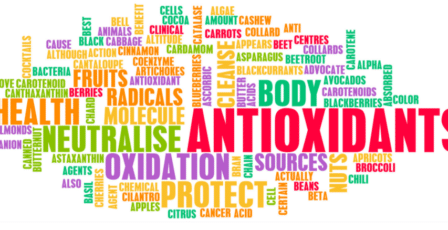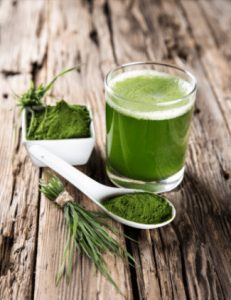
Can antioxidants reduce the effects of strength training?
A healthy lifestyle is essential for people who do strength training. Without a proper diet and supplementation, it would be tough to gain muscle mass. In the context of a healthy diet, a lot of attention is paid to antioxidants’ role, i.e., compounds responsible for removing free radicals. No doubt they are essential for health. However, some studies indicate that antioxidants can hurt the effects of strength training. What is this due to, and how can we counteract such a relationship?
 Antioxidants and their impact on human health
Antioxidants and their impact on human health
One of the essential functions of our body is breathing. However, this process does not end with merely inhaling and exhaling. Cellular respiration is equally crucial. It is a complex metabolic process occurring in virtually every cell of the human body. This process leads to the formation of ATP, the primary carrier of energy.
Unfortunately, during cellular respiration, compounds with adverse effects on our health are also formed. Here, so-called free radicals are particularly notorious. These are oxidized molecules that have not been bound to an electron. As a result, the body cannot use them and thus seeks to remove them.
Free radicals can have two effects on the human body. In moderate amounts, they have a beneficial effect because they stimulate the immune system. This makes it easier for the body to fight off viruses and bacteria. However, an excess of free radicals is already quite a danger. High concentrations of these cells interfere with many essential metabolic processes. This, in turn, can lead to dangerous diseases such as cancer, diabetes, and cardiovascular disease.
The body is only able to neutralize part of the free radicals on its own. However, substances known as antioxidants can help. The principle of their action is straightforward. When antioxidants enter the human body, they begin to interact with free radicals by “donating” an electron. This makes such molecules usable again. In this case, therefore, there is an apparent relationship – a higher concentration of antioxidants in the body affects the reduction of free radicals.
Antioxidants themselves can be divided into two categories. The first of them are endogenous antioxidants, i.e., naturally produced by the human body. The second category includes exogenous antioxidants supplied with food.
 Why is taking antioxidants not always beneficial?
Why is taking antioxidants not always beneficial?
The amount of endogenous antioxidants produced is relatively small. Therefore, they should be supplemented with antioxidants obtained from food. A diet rich in exogenous antioxidants will make the body neutralize free radicals more effectively. This, in turn, is an integral part of cancer prevention and many other diseases.
The beneficial effect of antioxidants has been recognized by doctors and nutritionists, who decades ago urged to maximize the supply of these components in the daily diet. Dietary supplements containing substances with antioxidant properties also began to enjoy great popularity. However, with time, scientists became more and more familiar with antioxidants’ influence on the human body. As a result of this work, an absolute dependency was discovered, which may surprise people who train for strength.
Namely, scientists have shown a correlation between a too high concentration of antioxidants in the body and weaker strength training results. How is this even possible? To explain this phenomenon, we need to take a closer look at free radicals. It is already known that they are formed during cellular respiration. Of course, during exercise, the respiration process gains in intensity. As a result, the body produces many more free radicals, which mobilizes the immune system to remove them. However, in this case, it is beneficial because it increases immunity and stimulates the body’s regeneration.
However, it turns out that taking very high doses of antioxidants inhibits the described process. High concentrations of substances with antioxidant properties contribute to the immediate removal of free radicals from the body. Thus, the body does not receive stimuli that would typically lead to a reaction from the immune system.
 In addition to this, scientists have also put forward another exciting hypothesis. According to it, the phenomenon of oxidative stress also affects the recovery of the body after exercise. According to the researchers, this is the effect of antioxidants that block the release of stimuli necessary to repair damaged muscle tissue. This, in turn, can affect both more inadequate post-workout recovery and the training effects themselves. Although this hypothesis has not been unequivocally confirmed, antioxidants’ impact on strength training remains a controversial issue, to say the least.
In addition to this, scientists have also put forward another exciting hypothesis. According to it, the phenomenon of oxidative stress also affects the recovery of the body after exercise. According to the researchers, this is the effect of antioxidants that block the release of stimuli necessary to repair damaged muscle tissue. This, in turn, can affect both more inadequate post-workout recovery and the training effects themselves. Although this hypothesis has not been unequivocally confirmed, antioxidants’ impact on strength training remains a controversial issue, to say the least.
Should strength trainees limit their intake of antioxidant-rich foods?
The presented relationship may make strength trainers begin to approach antioxidants with greater caution. However, we cannot forget about the beneficial effects of these substances. Therefore, limiting the intake of antioxidants may do more harm than good.
However, if someone cares about the appropriate amount of antioxidants in their diet, they should resign from additional supplementation. Preparations containing antioxidants are recommended only for people who, for various reasons, cannot provide them with food.
Summary
Antioxidants undoubtedly have a positive effect on health. Their deficiencies may lead to numerous diseases and ailments. However, people who train for strength should not exaggerate their amount. Too high levels of antioxidants can hurt the effects of strength training. Therefore moderation is advisable.



